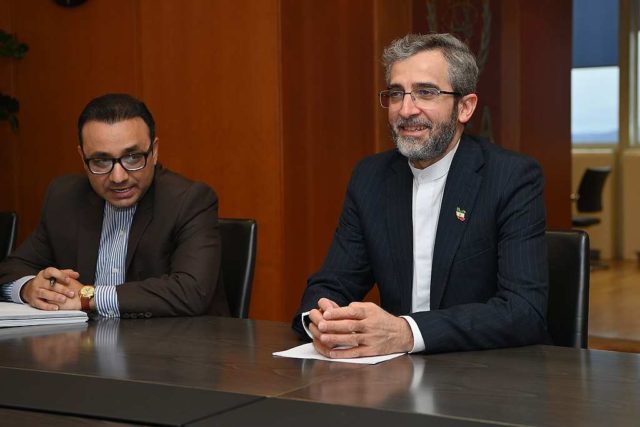
Iranian negotiator returns to Tehran amid ‘optimism’ over nuclear deal Ali Bagheri Kani (IAEA Imagebank/WikiCommons)
This article was originally published by Radio Free Europe/Radio Liberty and is reprinted with permission.
Iran’s top negotiator at talks to revive the 2015 nuclear deal returned to Tehran from Vienna for consultations as the country’s foreign minister said the discussions had reached a “sensitive and important point.”
The Iranian Foreign Ministry announced on February 23 that negotiator Ali Bagheri Kani was returning to Tehran for “a short trip,” and Foreign Minister Hossein Amirabdollahian told a news conference in Tehran that the talks were at a sensitive stage.
“We wonder whether the Western side can adopt a realistic approach to go through the remaining points of the talks,” Amirabdollahian said, speaking alongside his Omani counterpart, who arrived earlier in Tehran for a visit.
Amirabdollahian said he was “optimistic” about a deal, while insisting without elaboration that Iran would not give up its “red lines.”
Omani Foreign Minister Sayyid Badr Albusaidi’s visit to Tehran raised the potential that Oman could operate as an intermediary in the ongoing nuclear talks. Oman has often acted as a go-between to help facilitate diplomacy between the United States and Iran.
Amirabdollahian said last week that Tehran was ready to swap prisoners with the United States but said it would be “a humanitarian issue” unrelated to the nuclear accord.
Negotiations to revive the pact, under which Tehran agreed to curb sensitive nuclear activities in exchange for sanctions relief, began more than 10 months ago in Vienna.
In 2018, then-U.S. President Donald Trump pulled the United States out of the deal and reimposed stringent sanctions that have battered Iran’s economy and its currency. After Washington withdrew, Iran began violating some of the pact’s nuclear limits.
Iran’s Foreign Ministry said on February 21 that the talks had made “significant progress,” although there were still unresolved issues.
Foreign Ministry spokesman Saeed Khatibzadeh noted that “nothing is agreed until everything is agreed” and said “the remaining issues are the hardest.”
Diplomats from parties involved in the negotiations have recently said the talks had reached a crucial stage. French Foreign Minister Jean-Yves Le Drian told parliament on February 16 they were at a “tipping point.”
The talks involve negotiators from Britain, China, France, Germany, and Russia. The United States is taking part indirectly because Iran refused to meet face-to-face with the American delegation.




